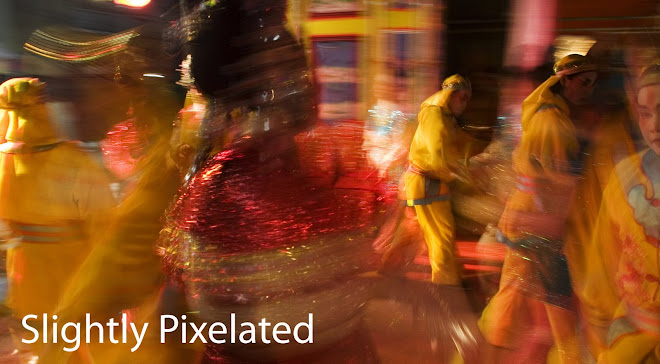
It is almost impossible to understand the folly into which Thailand, Buddhist kingdom of tolerance and smiles, has descended.
The country's two main airports have been closed for the past 5 days affecting over 100,000 international travellers and inflicting incalculable damage on this nation's once effervescent economy.

The People's Alliance for Democracy (PAD) flaunts the law and taunts the government with impunity. It's control of vital infrastructure smacks more of insurrection than mere 'protest'.
The Nation newspaper reported today that PAD guards had arrested a plainclothes policewomen who narrowly escaped being lynched by angry demonstrators at Don Muang airport. It is a strange reversal of roles when the security apparatus of a protest movement starts arresting police officers.
Earlier in the day police retreated when confronted by PAD security guards at checkpoints on the road to Suvarnabhumi international airport.
Both these events underline the impunity with which the PAD can now act; publicly undermining the credibility and authority of the police and government while adding to a growing sense that the country has slipped beyond the effective control of the state.
Since its emergence in 2006, the PAD has moved a long way beyond its original mission to remove former Prime Minister Thaksin Shinawatra (ousted in a military coup in September 2006) and his cronies towards something more akin to a conservative revolution.
The PAD's inappropriately named New Politics proposal outlines a system where only 30% of government would be directly elected by the people. This would shift Thailand away from its existing 'one man one vote' system throwing the nation's democratic evolution into reverse.
It is hard to comprehend how the PAD, a movement that currently mobilises perhaps 30-40,000 supporters in Bangkok, has managed to take Thailand's economy and political system hostage.
The protesters occupying Suvarnabhumi airport number 3-4,000 people (at the lowest points), composed mainly of ordinary middle class folk, many of whom are women. Security is provided by a thin crust of highly motivated PAD guards who are referred to as 'Sivichai fighters' ('Nak Rop Sivichai' in Thai).

The PAD has a seemingly inexhaustible supply of funds and appears to benefit from some very highly placed support, creating a sort of force field of judicial immunity. The movement's legitimacy was given a major boost when Queen Sirikit attended the funeral of a PAD protester killed in the riots outside Parliament on October 7th.
Holed up in the northern capital of Chiang Mai, an hour's flight from Bangkok, the government of Somchai Wongsawat, though defiant, appears weak and indecisive. Somchai's reluctance to return to Bangkok, the epicenter of political life, reinforces the image of a regime that is literally losing its grip on the levers of power.
Similarly, the government's inability or unwillingness to take action against PAD activists occupying strategic locations suggests either that it is simply too weak to act or that it believes there is some strategic political advantage to be gained from letting the PAD take control of such key facilities.
A measure of the government's insecurity was that it did not dare launch a police action without declaring a State of Emergency at the airports and gaining the explicit support of the courts. In any normal situation an incumbent government would be well within its rights to expel protesters from a strategic facility such as an international airport.
The role of the nation's armed forces also remains unclear. Despite calls by the PAD leadership, the army has refused to step into the fray. Its commanders are aware that military intervention would provide a temporary halt to hostilities but would not address the fundamental divisions fuelling the current crisis.
The government at one point announced that the navy and air force would be used to help disperse protesters at the two airports but they have so far taken no action.
The military is possibly waiting for a more significant deterioration of the situation that would enable its commanders to argue that the country is completely ungovernable, giving the military an excuse to assume a more permanent expanded role in Thai politics.
Meanwhile Thailand is in a state of suspended animation. The streets, though abuzz with coup rumours, bear testimony to a strange dislocation between the sporadic violence and growing intensity of Thailand's crisis and the banality of everyday life which continues virtually uninterrupted.
But if Thailand's streets remain clogged with traffic and its local markets continue to bustle, the nation's balance of international credibility is rapidly evaporating. The short and long term outlook for Thailand's economy, already buffeted by a global downturn, is grim. Much of Thailand's appeal as an investment location has resided in the relative reliability of its infrastructure, the convenience of its geographical location as a flight hub and its ability to insulate the economy from the shenanigans of its politicians.
The current situation bears little ideological analysis. Thailand's elites are engaged in a cynical battle of interests, the outcome of which will likely determine the nation's political future, most particularly in the period following the passing of Thailand's much revered monarch who has become the traditional arbiter in times of deep crisis.
Hell bent on advancing their own agenda's Thailand's political leaders seem so blinded by their ambition that they cannot, or prefer not, to see the huge damage they are inflicting on the country. The principal losers, sadly, will be the Thais themselves, whose genius for finding smiles amidst conflict has, till now, seen them through so many dark times.





